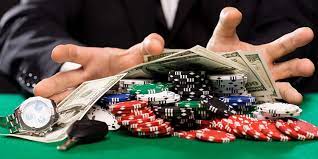
Gambling refers to the act of participating in games of chance or betting on uncertain outcomes, usually involving the wagering of money or something of value. It is characterized by risking an asset or money with the hope of gaining more than what was initially staked. The outcome of gambling is predominantly determined by chance, although some forms of gambling, such as poker, involve an element of skill. It is a popular form of entertainment and recreation for many individuals, but it can also lead to addiction and financial difficulties if not practiced responsibly.
History of Gambling:
The history of gambling dates back thousands of years and has been present in various forms across different cultures throughout the world. Here’s an overview of the history of gambling:
- Ancient Origins:
- China: The earliest recorded evidence of gambling comes from ancient China, around 2300 BC. Various forms of gambling, including dice games, tiles, and card games, were popular.
- Egypt: Ancient Egyptians engaged in games of chance, such as dice and board games, as early as 2000 BC. Gambling scenes can be found depicted on ancient Egyptian tombs and monuments.
- Greece and Rome: Greeks and Romans had a fondness for dice games and wagering on sporting events. The Roman Empire embraced gambling, and it became deeply intertwined with their culture.
- Middle Ages and Renaissance:
- Europe: Gambling activities were prevalent during the Middle Ages, with games like dice, cards, and lotteries. However, gambling was often subject to legal restrictions and moral scrutiny.
- Asia: In Asia, gambling continued to thrive, with popular games like Mahjong originating in China during the Ming Dynasty (1368-1644).
- Development of Casinos:
- 17th and 18th Centuries: The concept of the casino emerged during the 17th and 18th centuries. The Ridotto in Venice, Italy (1638), is considered one of the earliest known gambling establishments resembling a casino.
- 19th Century: Casinos spread across Europe and the United States, with popular gambling destinations emerging, such as Monte Carlo and Las Vegas.
- Early 20th Century: The introduction of slot machines and the legalization of gambling in various regions led to the development of the modern casino industry.
- Modern Era:
- Casino Resorts: In the mid-20th century, casino resorts started to gain prominence, offering a combination of gambling, entertainment, and accommodation.
- Online Gambling: With the rise of the internet, online gambling became possible. The first online casino was launched in 1994, and since then, online gambling has grown significantly.
Throughout history, gambling has faced both acceptance and opposition. It has been regulated and even banned in various jurisdictions at different times due to concerns over addiction, social problems, and moral considerations. However, in many places, it has been embraced as a form of entertainment and a means of generating revenue through taxation and licensing.
Today, gambling is a multi-billion-dollar industry, encompassing land-based casinos, online gambling platforms, sports betting, lotteries, and more. The specific regulations and cultural attitudes towards gambling vary widely from country to country.
Types of Gambling Games:
There are numerous types of gambling games, ranging from casino games to sports betting. Here are some common forms of gambling:
- Casino Games:
- Slot Machines: Players insert coins or tokens into the machine and spin the reels in hopes of lining up matching symbols for a win.
- Blackjack: A card game where players aim to get a hand value as close to 21 as possible without exceeding it, while competing against the dealer.
- Roulette: Players place bets on numbers or combinations of numbers on a spinning wheel. The winning number is determined by where the ball lands.
- Poker: A card game where players compete against each other, aiming to have the best hand or convince others to fold.
- Card Games:
- Baccarat: Players bet on whether the banker’s or the player’s hand will have a total closest to nine.
- Texas Hold’em: A popular variant of poker where players are dealt two private cards and share five community cards to make the best hand.
- Three Card Poker: Players aim to have a better three-card hand than the dealer to win.
- Dice Games:
- Craps: Players wager on the outcome of the roll or a series of rolls of two dice. Bets can be placed on various possible combinations.
- Sic Bo: A dice game where players bet on the outcome of three dice being rolled.
- Lottery and Number Games:
- Bingo: Players mark off numbers on a card as they are called out, aiming to complete a specific pattern for a win.
- Keno: Players select numbers from a pool, and a random draw determines the winning numbers.
- Sports Betting:
- Betting on the outcome of sporting events, such as football, basketball, horse racing, or boxing. Bets can be placed on the final result, point spreads, or various other aspects of the game.
- Other Games:
- Wheel of Fortune: Players bet on which segment the spinning wheel will stop at.
- Scratch Cards: Players purchase cards with concealed areas that can be scratched to reveal potential prizes.
These are just a few examples, and there are many more gambling games available, including variations and regional-specific games. It’s important to remember that each game has its own rules and odds, so it’s advisable to familiarize oneself with the specific rules and strategies before participating.

Facts about Gambling:
- Addiction Potential: Gambling can be addictive for some individuals. The thrill of winning, the excitement of the game, and the potential for financial gains can lead to a compulsive gambling behavior that can have adverse effects on a person’s life.
- Risk of Financial Loss: Gambling involves the risk of losing money. While some individuals may experience wins, the majority of gamblers will experience losses over time. It’s important to gamble responsibly and only risk what one can afford to lose.
- Revenue Generation: The gambling industry is a significant source of revenue for many countries http://ecgma.co.za and regions. Taxes and licensing fees generated from gambling activities often contribute to public programs and services.
- Employment Opportunities: The gambling industry creates numerous job opportunities. Casinos, online gambling platforms, and related businesses employ a large workforce, including dealers, security personnel, marketing professionals, and administrative staff.
- Regulation and Licensing: Many jurisdictions have specific regulations and licensing requirements for gambling operations. These regulations aim to ensure fair play, prevent fraud, protect consumers, and minimize the negative consequences associated with gambling.
- Responsible Gambling Initiatives: Many gambling operators and organizations promote responsible gambling practices. These initiatives aim to raise awareness about the risks of gambling addiction and provide resources and support for individuals who may have gambling-related problems.
- Social and Economic Impact: The presence of casinos and other gambling establishments can have both positive and negative effects on local communities. While they can contribute to tourism, entertainment, and economic growth, they may also lead to increased crime rates and social issues if not properly regulated.
- Online Gambling Growth: The advent of the internet has significantly expanded the gambling industry. Online gambling platforms offer a wide range of games and betting options, allowing people to gamble from the comfort of their own homes. This convenience has contributed to the growth of online gambling popularity.
- Problem Gambling Help: Various organizations and helplines exist to assist individuals struggling with gambling addiction. These resources provide support, counseling, and treatment options for those affected by problem gambling.
- Cultural and Historical Significance: Gambling has been present in many cultures throughout history. It has played a role in folklore, literature, and entertainment, reflecting its enduring popularity and cultural significance.
It’s essential to approach gambling responsibly and be aware of the potential risks involved. If you or someone you know is experiencing difficulties related to gambling, seeking professional help is strongly encouraged.

0 Comments for “Gambling | Definition, History, Games, & Facts”